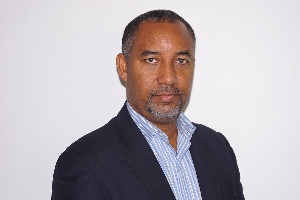The Ghana National Petroleum Corporation (GNPC) has refuted allegations that it is a reserve fund that government dips its hands into at will.
The Chief Executive Officer, Mr. Alexander Mould, insisted that monies owed the Corporation were given for specific infrastructure projects related to gas delivery.
“On the Atuabo Gas processing plant, for example, we financed the construction of a pipeline and also spent additional funds in constructing access roads to enable the evacuation of LPG to serve Ghanaian consumers. The agreement is that we will be reimbursed,” Alexander Mould told the B&FT.
“The amount was therefore not advanced to government as a slush fund. It’s specifically given to construct the roads and pipelines that were critical for supplying gas for electricity generation, and supplying LPG to Ghanaian consumers,” he said in response to concerns in the public sphere that government is borrowing recklessly from the Corporation.
“The US$50million that the Auditor-General’s report for the year ended December 31, 2014, is captured as money owed the corporation by the Finance Ministry; and as well another US$34million was advanced for spending on the aforesaid gas infrastructure projects,” he said.
The GNPC boss indicated there are arrangements in place for GNPC to be reimbursed, and that the Corporation is working with the Ministries of Petroleum and Finance to settle the outstanding amount.
Following release of the Auditor General’s report, concerns were raised in the public domain that government is unduly borrowing from the Corporation, with the Africa Centre for Energy Policy calling it a ‘slush fund’ for government.
Mr. Mould however said that as the national oil company and national Gas Sector Aggregator, GNPC has the primary responsibility to enable development of the gas market, and work to eliminate bottlenecks to the supply of gas in the country.
He pointed to the Corporation’s obligations to offtake gas from all upstream partners including those of Jubilee, TEN and Sankofa -- adding that infrastructure bottlenecks are no excuse for the GNPC’s obligations not to be met under the various gas sales agreements it has signed with those partners.
A third amount -- US$52,348,305 owed the Corporation by the Tema Oil Refinery (TOR), according to the GNPC boss -- was for outstanding balance on fuel supplied to TOR.
He explained that amid acute shortage of fuel in the country, government called on GNPC to assist with crude imports between November 2009 and May 2011. This intervention by GNPC averted shortages which would have crippled businesses and immobilised the commuting public.
GNPC were the counterparty in the crude oil Government-to-Government contract between Ghana and Nigeria. The crude oil imported was refined by TOR under agreement with GNPC, and sold to BDCs.
However, TOR still owes GNPC -- apparently due to cash flow challenges. Meanwhile, to halt the excessive interest that the outstanding balance was attracting, GNPC had to pay BNP Paribas -- issuer of the letters of credit (L/C) covering the importation.
Mr. Mould said the GoG as shareholder of TOR is aware of this liability and has acknowledged the indebtedness, for which GNPC is negotiating a repayment plan.
ACEP however questioned in a press release: “Is it prudent for GNPC to leave its core functions and instead advance its money provided under the Petroleum Revenue Management Act (PRMA) to government, which is already entitled to more than 70% of oil revenue for the budget and savings?”
The Corporation’s money, the energy policy think-tank argues, should be “ring-fenced” to block government from accessing it at will.
However, for GNPC there is no basis whatsoever for the questions on these transactions, which have been acknowledged by government and also been duly reported to the sector ministry, Parliament, PIAC and the State Enterprises Commission; and referring to GNPC as government’s ‘slush fund’ is unjustified.
Mr. Mould added: "Once again, it is very sad that organisations do not interface with GNPC to ascertain the facts behind the numbers, but are quick to run to the press with only a glimmering of the facts".
Business News of Wednesday, 6 April 2016
Source: B&FT

















